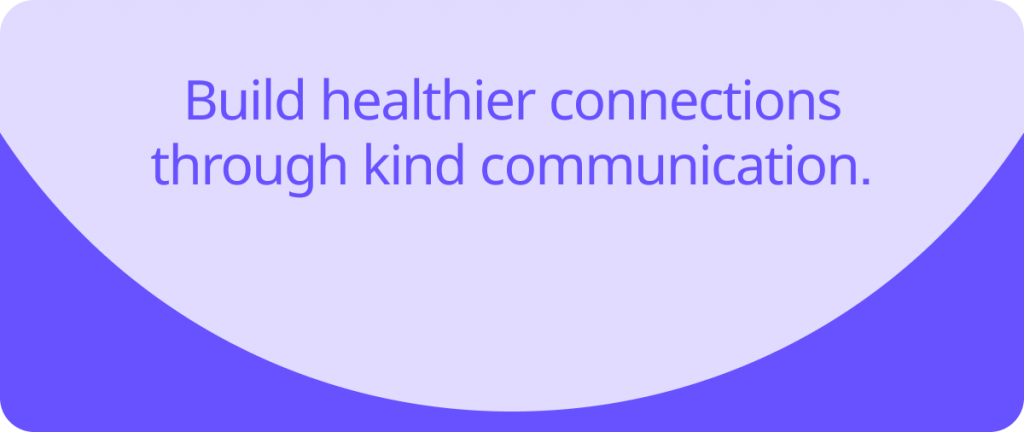The Art of Kind Communication: How to Be Kind When You Speak

Table of contents
Have you ever faced the challenge of misunderstanding, conflict, or strained connections due to harsh words or thoughtless communication? If so, you’re not alone.
In this article, we’ll explore the subtle yet powerful art of speaking with kindness. Kind communication goes beyond mere words; it’s about fostering understanding, empathy, and respect in our interactions. Even when we don’t feel like being kind or respectful.
Through practical tips and insights, we’ll unravel the secrets to infusing your conversations with warmth and compassion. Whether in personal relationships or professional settings, mastering kind communication can make a world of difference. So, let’s embark on this enlightening voyage to discover how a little kindness in your words can transform your connections and create a more harmonious world.

1. Understanding the Power of Kind Communication
Kind communication, often underestimated and overshadowed by more assertive or aggressive communication styles, holds incredible power. It transcends mere words and has the potential to reshape the dynamics of both personal relationships and the workplace.
Why Kind Communication Matters in Relationships
In personal relationships, kind communication is the cornerstone of emotional connection and harmony. It serves as a lubricant that keeps the cogs of any relationship running smoothly. Here are some compelling reasons why kind communication is vital:
- Fosters Trust and Vulnerability: When you communicate with kindness, you create a safe space where trust can flourish. People are more likely to open up, express their thoughts, and be vulnerable when they know they will be met with understanding and compassion.
- Strengthens Emotional Bonds: Kind words and gestures strengthen emotional bonds between individuals. They remind us that we are valued, appreciated, and loved during both good times and challenging moments.
- Resolves Conflicts Constructively: It encourages active listening, empathy, and a willingness to find common ground. It transforms disputes into opportunities for growth and understanding.
Why Kind Communication Matters in the Workplace
Kind communication is equally significant in the professional sphere. In fact, it can be a game-changer in terms of team dynamics, productivity, and employee well-being:
- Enhances Team Collaboration: When colleagues communicate respectfully and offer support, it promotes a sense of belonging and cooperation, leading to better teamwork and project outcomes.
- Boosts Employee Morale: Feeling appreciated and valued contributes to job satisfaction and reduces turnover rates. It’s a simple but effective way to create a positive work environment.
- Reduces Stress and Promotes Mental Health: A supportive and compassionate workplace reduces stress levels, minimizes burnout, and contributes to better overall mental well-being among employees.

2. Building Stronger Connections Through Kind Words
Kind words have the remarkable ability to strengthen the bonds between individuals, fostering love, trust, and intimacy. In this section, we will explore techniques for expressing love and gratitude in personal relationships, as well as strategies for resolving conflicts with compassion and kindness.
Techniques for Expressing Love and Gratitude in Personal Relationships
- Speak from the Heart: When you truly feel appreciation or affection, share it openly and honestly. Use phrases like “I love you,” “I appreciate you,” or “I’m grateful for…”
- Show Appreciation Through Actions: Surprise your loved ones with small gestures of kindness, such as leaving heartfelt notes, preparing their favorite meal, or offering a sincere compliment.
- Listen Actively: Kind communication is a two-way street. Give them your full attention, ask follow-up questions, and engage in their stories. This simple act can convey deep appreciation.
Resolving Conflicts with Compassion and Kindness
Conflict is an inevitable part of any relationship. However, how you navigate and resolve these conflicts can make all the difference. Here are strategies for addressing disagreements with compassion and kindness:
- Stay Calm and Collected: When conflicts arise, emotions can run high. Avoid raising your voice or using hurtful language. Instead, take a deep breath and approach the situation with a level head.
- Use “I” Statements: Shift the focus from blame to expressing your feelings and needs by using “I” statements. For example, say, “I feel hurt when…” rather than pointing fingers with “You always…” This approach encourages open dialogue without defensiveness.
- Seek Common Ground: Approach conflicts as opportunities for growth and understanding. Be willing to compromise and show empathy toward the other person’s needs and desires.
- Offer Sincere Apologies: If you’ve made a mistake or hurt someone with your words, apologize sincerely. Make amends by taking responsibility for your actions.
If you struggle with uncomfortable conversations, read our Instagram post about uncomfortable conversations and our blog post about fear of confrontation.

3. Building a Habit of Kindness in Your Words for Lasting Change
It’s true you won’t always feel like being kind. It’s only natural to feel anger and disappointment, both in personal relationships and work. Even though we encourage you to be comfortable with all your emotions, if your goal is make kind communication a habit, here are some ideas:
- Set Clear Intentions: Start with why you want to be kind to others, and set clear intentions that also respect your boundaries.
- Practice Mindful Awareness: Pay close attention to your words and how they may affect others. Before speaking, take a moment to consider the impact of your words on the recipient.
- Establish a Routine: Create a daily routine that includes moments of intentional kindness. Whether it’s starting your day with positive affirmations or ending it by expressing gratitude to loved ones, establish rituals that reinforce your commitment to kind communication.
- Learn from Mistakes: Kindness is a journey, and you may stumble along the way. Reflect on your interactions, identify areas for improvement, and make a conscious effort to do better next time.
4. Final Thoughts and Content Recommendations
Sustaining kind communication over time requires commitment, self-awareness, and continuous effort. By building a habit of kindness in your words and actions and regularly assessing your progress, you can make lasting changes in your relationships, workplace interactions, and personal well-being. Celebrate your successes, no matter how small, and continue to nurture the power of kind communication in your life.

